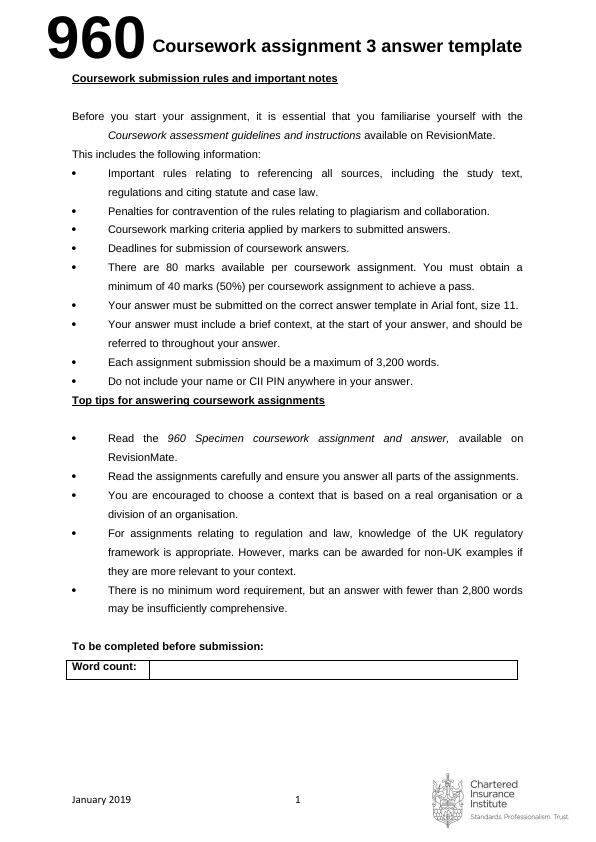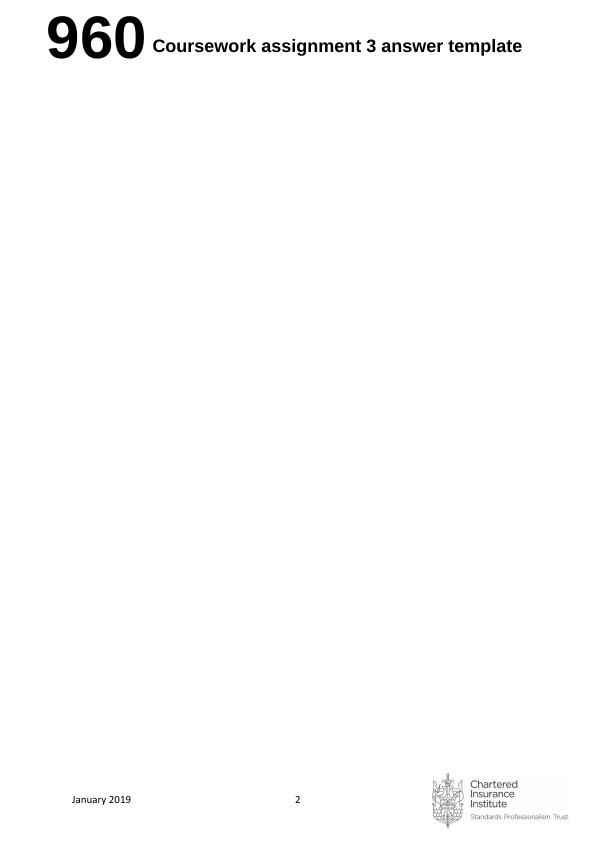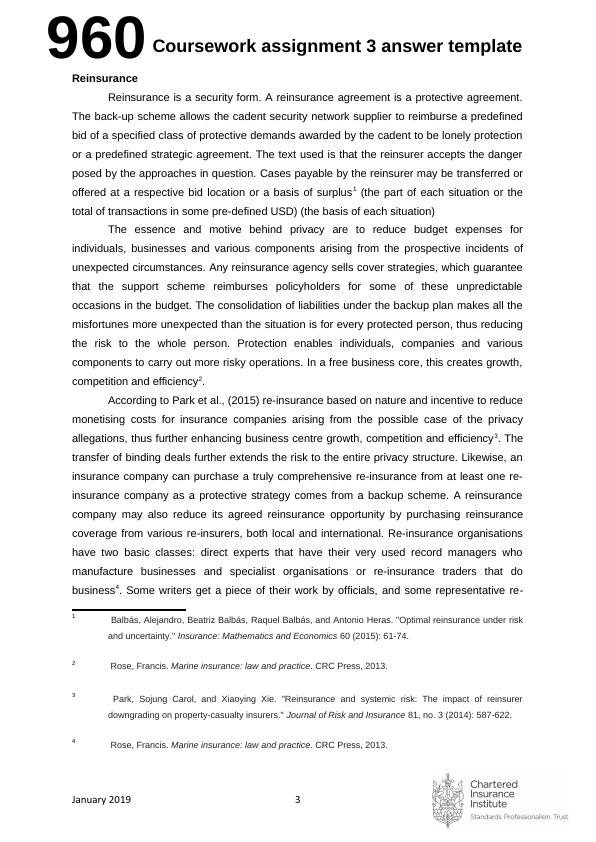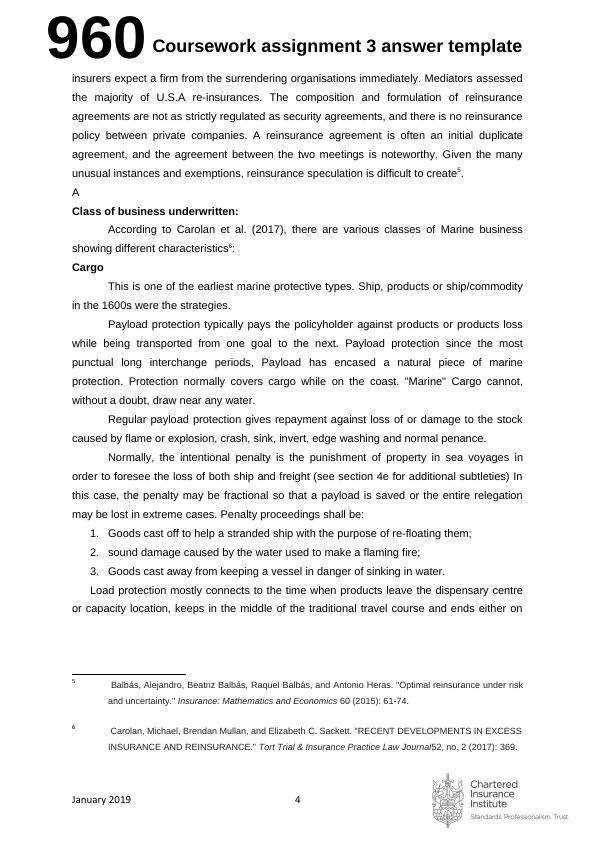Coursework Assignment 3 Answer Template
Added on 2023-01-19
11 Pages4178 Words67 Views
Coursework assignment 3 answer template960Coursework submission rules and important notes
Before you start your assignment, it is essential that you familiarise yourself with the
Coursework assessment guidelines and instructions available on RevisionMate.
This includes the following information:
Important rules relating to referencing all sources, including the study text,
regulations and citing statute and case law.
Penalties for contravention of the rules relating to plagiarism and collaboration.
Coursework marking criteria applied by markers to submitted answers.
Deadlines for submission of coursework answers.
There are 80 marks available per coursework assignment. You must obtain a
minimum of 40 marks (50%) per coursework assignment to achieve a pass.
Your answer must be submitted on the correct answer template in Arial font, size 11.
Your answer must include a brief context, at the start of your answer, and should be
referred to throughout your answer.
Each assignment submission should be a maximum of 3,200 words.
Do not include your name or CII PIN anywhere in your answer.
Top tips for answering coursework assignments
Read the 960 Specimen coursework assignment and answer, available on
RevisionMate.
Read the assignments carefully and ensure you answer all parts of the assignments.
You are encouraged to choose a context that is based on a real organisation or a
division of an organisation.
For assignments relating to regulation and law, knowledge of the UK regulatory
framework is appropriate. However, marks can be awarded for non-UK examples if
they are more relevant to your context.
There is no minimum word requirement, but an answer with fewer than 2,800 words
may be insufficiently comprehensive.
To be completed before submission:
Word count:
January 2019 1
Before you start your assignment, it is essential that you familiarise yourself with the
Coursework assessment guidelines and instructions available on RevisionMate.
This includes the following information:
Important rules relating to referencing all sources, including the study text,
regulations and citing statute and case law.
Penalties for contravention of the rules relating to plagiarism and collaboration.
Coursework marking criteria applied by markers to submitted answers.
Deadlines for submission of coursework answers.
There are 80 marks available per coursework assignment. You must obtain a
minimum of 40 marks (50%) per coursework assignment to achieve a pass.
Your answer must be submitted on the correct answer template in Arial font, size 11.
Your answer must include a brief context, at the start of your answer, and should be
referred to throughout your answer.
Each assignment submission should be a maximum of 3,200 words.
Do not include your name or CII PIN anywhere in your answer.
Top tips for answering coursework assignments
Read the 960 Specimen coursework assignment and answer, available on
RevisionMate.
Read the assignments carefully and ensure you answer all parts of the assignments.
You are encouraged to choose a context that is based on a real organisation or a
division of an organisation.
For assignments relating to regulation and law, knowledge of the UK regulatory
framework is appropriate. However, marks can be awarded for non-UK examples if
they are more relevant to your context.
There is no minimum word requirement, but an answer with fewer than 2,800 words
may be insufficiently comprehensive.
To be completed before submission:
Word count:
January 2019 1

960Coursework assignment 3 answer template
January 2019 2
January 2019 2

960Coursework assignment 3 answer template
Reinsurance
Reinsurance is a security form. A reinsurance agreement is a protective agreement.
The back-up scheme allows the cadent security network supplier to reimburse a predefined
bid of a specified class of protective demands awarded by the cadent to be lonely protection
or a predefined strategic agreement. The text used is that the reinsurer accepts the danger
posed by the approaches in question. Cases payable by the reinsurer may be transferred or
offered at a respective bid location or a basis of surplus1 (the part of each situation or the
total of transactions in some pre-defined USD) (the basis of each situation)
The essence and motive behind privacy are to reduce budget expenses for
individuals, businesses and various components arising from the prospective incidents of
unexpected circumstances. Any reinsurance agency sells cover strategies, which guarantee
that the support scheme reimburses policyholders for some of these unpredictable
occasions in the budget. The consolidation of liabilities under the backup plan makes all the
misfortunes more unexpected than the situation is for every protected person, thus reducing
the risk to the whole person. Protection enables individuals, companies and various
components to carry out more risky operations. In a free business core, this creates growth,
competition and efficiency2.
According to Park et al., (2015) re-insurance based on nature and incentive to reduce
monetising costs for insurance companies arising from the possible case of the privacy
allegations, thus further enhancing business centre growth, competition and efficiency3. The
transfer of binding deals further extends the risk to the entire privacy structure. Likewise, an
insurance company can purchase a truly comprehensive re-insurance from at least one re-
insurance company as a protective strategy comes from a backup scheme. A reinsurance
company may also reduce its agreed reinsurance opportunity by purchasing reinsurance
coverage from various re-insurers, both local and international. Re-insurance organisations
have two basic classes: direct experts that have their very used record managers who
manufacture businesses and specialist organisations or re-insurance traders that do
business4. Some writers get a piece of their work by officials, and some representative re-
1 Balbás, Alejandro, Beatriz Balbás, Raquel Balbás, and Antonio Heras. "Optimal reinsurance under risk
and uncertainty." Insurance: Mathematics and Economics 60 (2015): 61-74.
2 Rose, Francis. Marine insurance: law and practice. CRC Press, 2013.
3 Park, Sojung Carol, and Xiaoying Xie. "Reinsurance and systemic risk: The impact of reinsurer
downgrading on property-casualty insurers." Journal of Risk and Insurance 81, no. 3 (2014): 587-622.
4 Rose, Francis. Marine insurance: law and practice. CRC Press, 2013.
January 2019 3
Reinsurance
Reinsurance is a security form. A reinsurance agreement is a protective agreement.
The back-up scheme allows the cadent security network supplier to reimburse a predefined
bid of a specified class of protective demands awarded by the cadent to be lonely protection
or a predefined strategic agreement. The text used is that the reinsurer accepts the danger
posed by the approaches in question. Cases payable by the reinsurer may be transferred or
offered at a respective bid location or a basis of surplus1 (the part of each situation or the
total of transactions in some pre-defined USD) (the basis of each situation)
The essence and motive behind privacy are to reduce budget expenses for
individuals, businesses and various components arising from the prospective incidents of
unexpected circumstances. Any reinsurance agency sells cover strategies, which guarantee
that the support scheme reimburses policyholders for some of these unpredictable
occasions in the budget. The consolidation of liabilities under the backup plan makes all the
misfortunes more unexpected than the situation is for every protected person, thus reducing
the risk to the whole person. Protection enables individuals, companies and various
components to carry out more risky operations. In a free business core, this creates growth,
competition and efficiency2.
According to Park et al., (2015) re-insurance based on nature and incentive to reduce
monetising costs for insurance companies arising from the possible case of the privacy
allegations, thus further enhancing business centre growth, competition and efficiency3. The
transfer of binding deals further extends the risk to the entire privacy structure. Likewise, an
insurance company can purchase a truly comprehensive re-insurance from at least one re-
insurance company as a protective strategy comes from a backup scheme. A reinsurance
company may also reduce its agreed reinsurance opportunity by purchasing reinsurance
coverage from various re-insurers, both local and international. Re-insurance organisations
have two basic classes: direct experts that have their very used record managers who
manufacture businesses and specialist organisations or re-insurance traders that do
business4. Some writers get a piece of their work by officials, and some representative re-
1 Balbás, Alejandro, Beatriz Balbás, Raquel Balbás, and Antonio Heras. "Optimal reinsurance under risk
and uncertainty." Insurance: Mathematics and Economics 60 (2015): 61-74.
2 Rose, Francis. Marine insurance: law and practice. CRC Press, 2013.
3 Park, Sojung Carol, and Xiaoying Xie. "Reinsurance and systemic risk: The impact of reinsurer
downgrading on property-casualty insurers." Journal of Risk and Insurance 81, no. 3 (2014): 587-622.
4 Rose, Francis. Marine insurance: law and practice. CRC Press, 2013.
January 2019 3

960Coursework assignment 3 answer template
insurers expect a firm from the surrendering organisations immediately. Mediators assessed
the majority of U.S.A re-insurances. The composition and formulation of reinsurance
agreements are not as strictly regulated as security agreements, and there is no reinsurance
policy between private companies. A reinsurance agreement is often an initial duplicate
agreement, and the agreement between the two meetings is noteworthy. Given the many
unusual instances and exemptions, reinsurance speculation is difficult to create5.
A
Class of business underwritten:
According to Carolan et al. (2017), there are various classes of Marine business
showing different characteristics6:
Cargo
This is one of the earliest marine protective types. Ship, products or ship/commodity
in the 1600s were the strategies.
Payload protection typically pays the policyholder against products or products loss
while being transported from one goal to the next. Payload protection since the most
punctual long interchange periods, Payload has encased a natural piece of marine
protection. Protection normally covers cargo while on the coast. "Marine" Cargo cannot,
without a doubt, draw near any water.
Regular payload protection gives repayment against loss of or damage to the stock
caused by flame or explosion, crash, sink, invert, edge washing and normal penance.
Normally, the intentional penalty is the punishment of property in sea voyages in
order to foresee the loss of both ship and freight (see section 4e for additional subtleties) In
this case, the penalty may be fractional so that a payload is saved or the entire relegation
may be lost in extreme cases. Penalty proceedings shall be:
1. Goods cast off to help a stranded ship with the purpose of re-floating them;
2. sound damage caused by the water used to make a flaming fire;
3. Goods cast away from keeping a vessel in danger of sinking in water.
Load protection mostly connects to the time when products leave the dispensary centre
or capacity location, keeps in the middle of the traditional travel course and ends either on
5 Balbás, Alejandro, Beatriz Balbás, Raquel Balbás, and Antonio Heras. "Optimal reinsurance under risk
and uncertainty." Insurance: Mathematics and Economics 60 (2015): 61-74.
6 Carolan, Michael, Brendan Mullan, and Elizabeth C. Sackett. "RECENT DEVELOPMENTS IN EXCESS
INSURANCE AND REINSURANCE." Tort Trial & Insurance Practice Law Journal52, no. 2 (2017): 369.
January 2019 4
insurers expect a firm from the surrendering organisations immediately. Mediators assessed
the majority of U.S.A re-insurances. The composition and formulation of reinsurance
agreements are not as strictly regulated as security agreements, and there is no reinsurance
policy between private companies. A reinsurance agreement is often an initial duplicate
agreement, and the agreement between the two meetings is noteworthy. Given the many
unusual instances and exemptions, reinsurance speculation is difficult to create5.
A
Class of business underwritten:
According to Carolan et al. (2017), there are various classes of Marine business
showing different characteristics6:
Cargo
This is one of the earliest marine protective types. Ship, products or ship/commodity
in the 1600s were the strategies.
Payload protection typically pays the policyholder against products or products loss
while being transported from one goal to the next. Payload protection since the most
punctual long interchange periods, Payload has encased a natural piece of marine
protection. Protection normally covers cargo while on the coast. "Marine" Cargo cannot,
without a doubt, draw near any water.
Regular payload protection gives repayment against loss of or damage to the stock
caused by flame or explosion, crash, sink, invert, edge washing and normal penance.
Normally, the intentional penalty is the punishment of property in sea voyages in
order to foresee the loss of both ship and freight (see section 4e for additional subtleties) In
this case, the penalty may be fractional so that a payload is saved or the entire relegation
may be lost in extreme cases. Penalty proceedings shall be:
1. Goods cast off to help a stranded ship with the purpose of re-floating them;
2. sound damage caused by the water used to make a flaming fire;
3. Goods cast away from keeping a vessel in danger of sinking in water.
Load protection mostly connects to the time when products leave the dispensary centre
or capacity location, keeps in the middle of the traditional travel course and ends either on
5 Balbás, Alejandro, Beatriz Balbás, Raquel Balbás, and Antonio Heras. "Optimal reinsurance under risk
and uncertainty." Insurance: Mathematics and Economics 60 (2015): 61-74.
6 Carolan, Michael, Brendan Mullan, and Elizabeth C. Sackett. "RECENT DEVELOPMENTS IN EXCESS
INSURANCE AND REINSURANCE." Tort Trial & Insurance Practice Law Journal52, no. 2 (2017): 369.
January 2019 4

End of preview
Want to access all the pages? Upload your documents or become a member.
Related Documents
Coursework assignment 1 answer templatelg...
|11
|3565
|41
Reinsurance: A Security Formlg...
|10
|3650
|71
Aviva plc: Digital First Insurerlg...
|11
|4028
|34
Insurance Risk Management: Mitigating Challenges and Strategieslg...
|11
|4104
|40
Financial Strategy of Aviva plc and Prudential Companylg...
|11
|4138
|75
Demand Factors of Cyber Insurancelg...
|11
|4017
|43